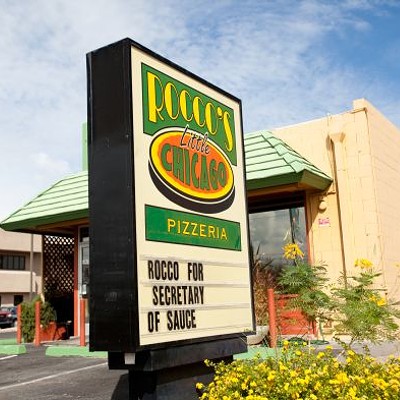As a community, we should be ashamed.
I've never understood why Tucson tolerates greyhound racing. Dogs are not animals in the usual sense. They don't produce useful products, provide us with food or even keep the grass trimmed. We live with them because we like them. We share our furniture with them, feed them scraps from our tables. We talk to them as if they understand and rely on them for friendship when no one else shows up. Dogs admire us far more than we deserve and forgive us when our actions don't warrant it. They are loyal to a fault, joyful most of the time, and if they knock the garbage over once in a while or take a dump on the neighbor's lawn, well, it's a small price to pay.
I know more than a few people for whom their pet dog is their best friend, confidant and companion. This is especially true of lonely children and old people. A kid can connect with his dog when no one else seems to care. And with kids and grandkids spread hither and yon, if it wasn't for the bichon frisé sitting on Granny's lap, she wouldn't have anybody at all.
As a volunteer for the Greyhound Adoption League of Tucson, I can say unequivocally that the greyhounds languishing under the so-called care of people like Rippetoe are the exact same creatures as Granny's bichon, the mutt you loved as a kid or the golden retriever guiding the blind person down Grant Road. The only difference is that, unfortunately, greyhounds run faster.
Or there may be one other difference: Greyhounds are sweeter. I've seen dogs so abused, they piss themselves upon a human entering their kennel--dogs so unaccustomed to any human kindness that teaching them to accept a collar and lead requires months or, on occasion, years. There's a category in greyhound rescue jargon called "spooks." A spook is a dog so traumatized by neglect and abuse, it bolts in the presence of any human being. It describes a dog which, when taken to a foster home, heads straight for the closet and won't come out for days, weeks or at all. I've seen all these things, but never have I seen a greyhound behave aggressively toward a human being. Not once.
There was a time in which I thought things were getting better. When I moved to Tucson, there were regular newspaper reports of dead racers found in the desert. They'd have their ears cut off. That's where the tattoos were, identifying the kennels they belonged to.
Now, I'm not so sure. The Greyhound Adoption League was evicted from its permanent kennel last November. Since then, it's been operating like an underground railroad, taking dogs directly from the track, often to places out of state. GAL used to handle upwards of 600 dogs a year; it does not handle nearly that many now. Instead, they languish in crates at the track, or kennels like Rippetoe's. Generally, when they start to die, somebody notices. It stinks.
I was working at GAL one morning, cleaning kennels and feeding, when a guy from the track brought four dogs in. They wore metal muzzles and strained at their leashes like refugees charging a closing border. Three were underweight and flea-bitten, but one looked worse than the rest. Upon inspection, it became obvious she was infested with hundreds of ticks, in her ears, between the pads of her paws, around her genitals--everywhere. Her entire right side was stained yellow from being crated, in her own urine, for weeks, maybe longer. We washed her three times and could not get the stain out.
All this sticks in my mind, but not as much as what the guy said as he handed me the dog. "This bitch ain't made me a nickel in damn near a year, but I still took care of her."
I wanted to shoot him. Now that I think about it, I still do.










